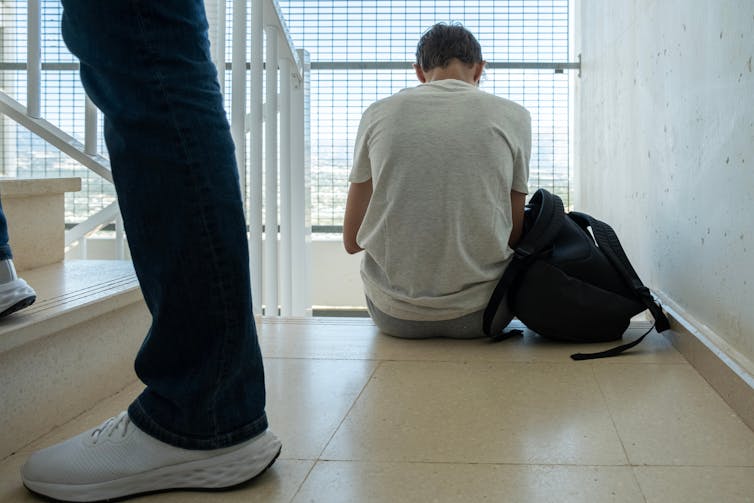Why school suspensions and exclusions have risen dramatically in England – and what could be done
Young people may be experiencing struggles that go under a school’s radar – until their behaviour leads to exclusion.

The government looks set to implement a shift in how behaviour is managed in English schools. This would focus on keeping pupils in attendance.
It comes after figures show that in the last academic year, school exclusions and suspensions in England reached the highest level ever recorded. There were 9,400 permanent exclusions in the 2022-23 academic year, nearly 3,000 more than the previous year. The number of suspensions, at 786,961, was an increase of over 200,000 from the 578,300 given out in 2021-22.
What’s more, government data shows that children who receive free school meals and those with special education needs are far more likely to receive suspensions and face exclusion.
A key question here is whether increased use of suspensions and exclusions is the result of increasingly disruptive behaviour in schools – or if schools are being encouraged to take more punitive approaches to behaviour management.
Want more politics coverage from academic experts? Every week, we bring you informed analysis of developments in government and fact check the claims being made.
Sign up for our weekly politics newsletter, delivered every Friday.
Teachers have widely reported that pupil behaviour is worse following the COVID-19 lockdowns. A survey of more than 6,000 teachers carried out by the teachers’ union NASUWT found that 73% believed poor socialisation as a result of pandemic restrictions was causing a decline in behaviour.
My ongoing research, including research with my colleague Shaalan Farouk, also suggests young people can experience struggles that go under the radar in schools until their behaviour leads to exclusion.
Struggles with secondary
In one study, we interviewed 11 young people who had been excluded from school. We have continued this work with further research (as yet not published in a peer-reviewed journal) with 20 young people. Both studies found that many of the pupils had struggled to make the transition from the relatively nurturing environment of primary school to secondary schools where they were expected to be more self-reliant.
The pupils valued the close relationships they had formed with primary school teachers, but lacked this kind of connection with teachers at secondary school. This meant that in many cases, schools were unaware of issues influencing behaviour – such as domestic violence or family bereavement.

It may well be the pressures teachers face in secondary schools, such as staffing issues caused by an ongoing recruitment and retention crisis, leave them with little capacity to address broader pastoral needs – so instead, they may enforce more punitive sanctions. When asked what was needed to help them deal with behaviour in school, teachers in the NASUWT survey raised increased pastoral support for pupils and smaller class sizes, as well as more support for families in poverty.
The 2019 Timpson review of school exclusion, commissioned by the former Conservative government, found that teachers felt they didn’t have the funding and resources to offer flexible support to students at risk of exclusion. This report also suggested that the pressure on schools to meet performance requirements – both in terms of attendance and exam grades – was leading to avoidable exclusions.
However, schools’ chosen approaches to discipline such as “zero-tolerance” policies may also be leading to avoidable exclusions.
For example, while carrying out research in a school that was in the process of transitioning into an academy, I was asked by the interim head teacher what I thought of the pupils. I said I found them friendly and willing to learn – to which he retorted that he found the pupils to be the worst-behaved he had met, and that his approach to addressing their behaviour was to exclude pupils and set a precedent.
The interim head teacher told me the school had excluded 65 pupils in three weeks. This was similar to a statement made to me by the head of another academy about its exclusion strategy, who claimed to have excluded 35 pupils in their opening tenure, although they didn’t disclose a timeframe.
It’s clear many teachers see exclusion as a necessary step to deal with problematic behaviour. Nearly 80% of the respondents in the NSUWT survey felt pupils with behavioural issues should be moved to other educational settings that better meet their needs.
When many teachers are dealing with stress and considering leaving the profession as a result of poor pupil behaviour, it may be unsurprising that they favour removing disruptive pupils from their classrooms.
Talking it through
My research with colleagues has also involved developing interventions that reduce exclusions. We have found that counselling and mentoring for students at risk of exclusion can be effective, including mentoring by people who have themselves experienced exclusion.
This involves listening to students’ and their parents’ concerns about their education, then helping them share these concerns with school leaders who have reached a point at which they can no longer find ways forward that avoid exclusion.
This mutual discussion helps the students, their parents and their teachers acknowledge and understand each other’s positions. Our evidence shows student behaviour improved as a result of these measures.
This approach requires more resources and time commitments – both hard to access in many secondary schools. But in return, it fosters the building of relationships between school staff, the students and their families, creating the connections that excluded young people feel are missing from their secondary school life.
So, if the government wants to keep more children in school, this may be the approach to take.
Simon Edwards receives funding from SLN: COP, SUN and other external organisations. He is affiliated with OCR and Social Pedagogy Professional Association.
